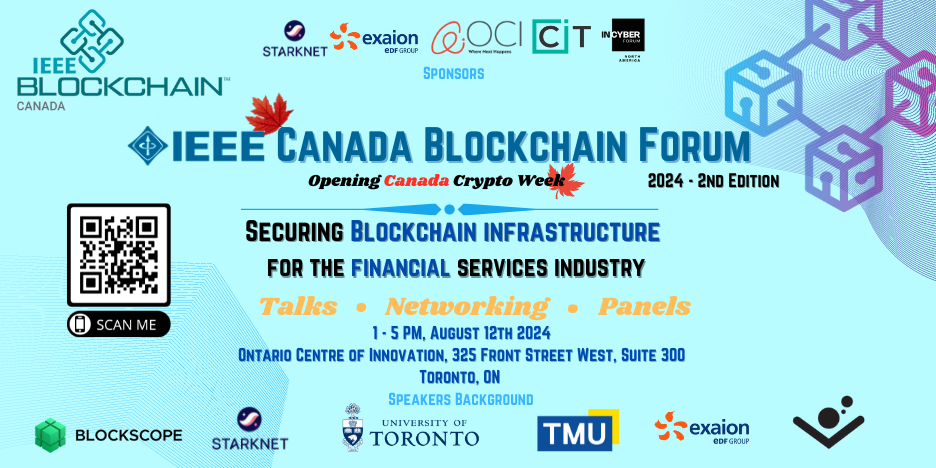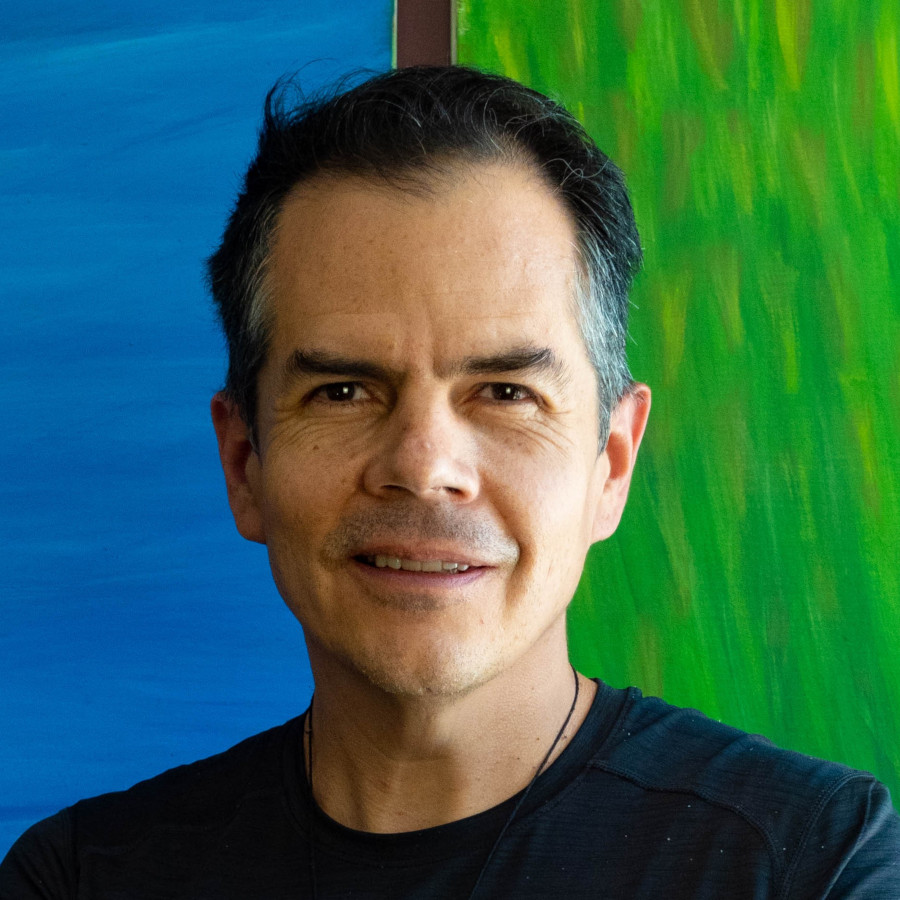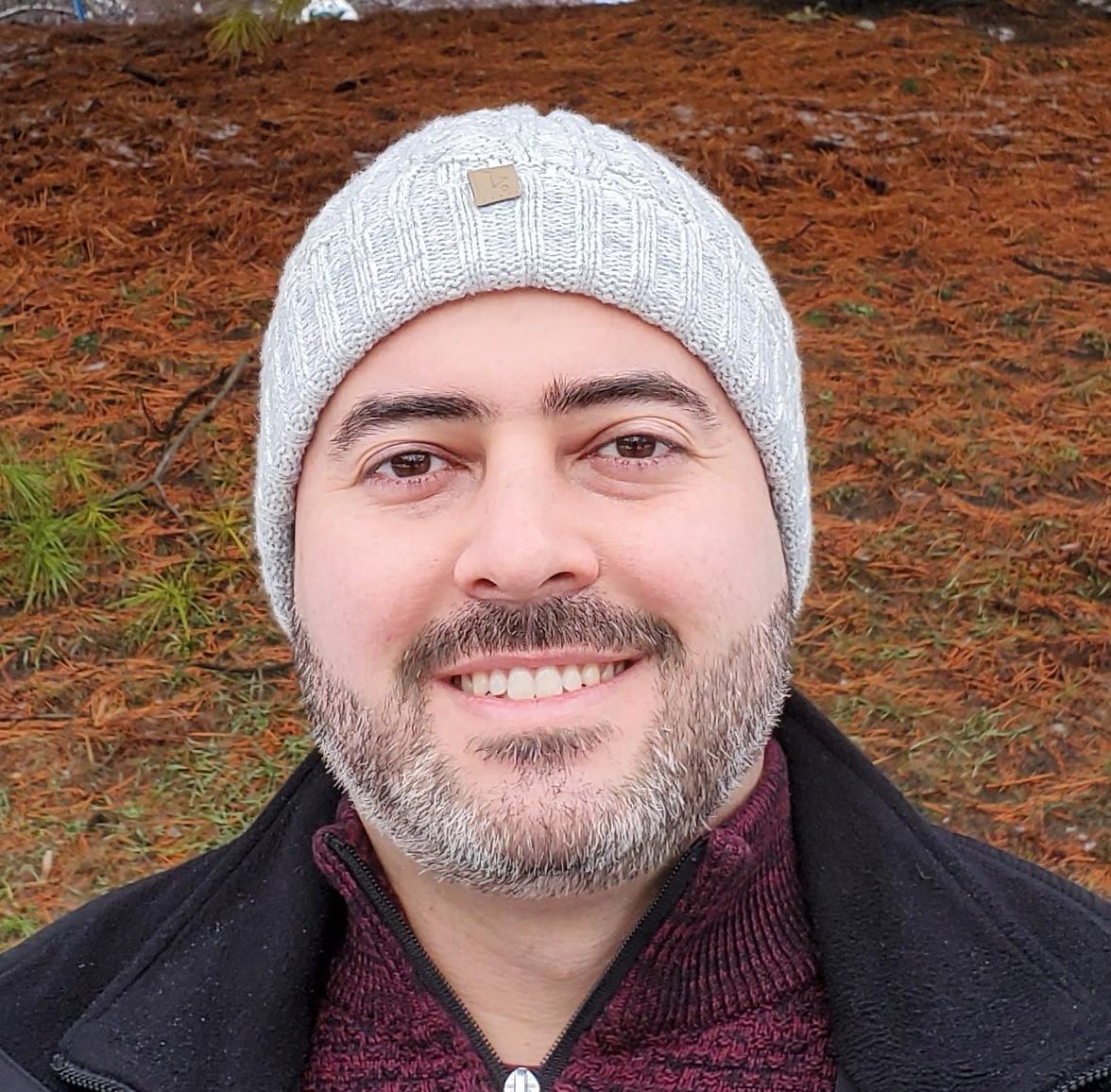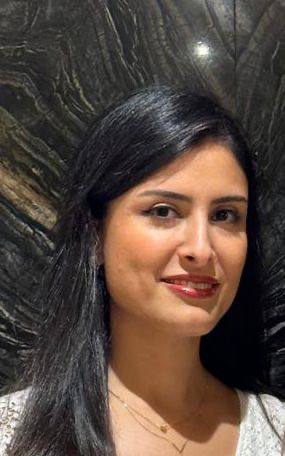IEEE Canada Blockchain Forum 2024 (2nd edition)
The IEEE Blockchain Forum is returning as part of Canada Crypto Week for a second edition. The goal of this forum is to congregate BUIDLers, researchers, academics, and engineers building blockchain protocols, infrastructure, and decentralized software applications.
Our theme for this year is Securing Blockchain infrastructure for the Financial Services Industry. Since our last gathering, two ETF launches brought the crypto industry a mile or two closer to mass adoption. The ranks of institutional players such as JP Morgan, Goldman Sachs, Société Générale (socgen), and others keep growing. Beyond the realm of finance, enterprise blockchain has found its way to the technology stack of industry leaders as diverse as Toyota, L'Oréal, Visa, and Samsung to name few. Still, this technology is fairly new. For example, the Ethereum network (the world computer doted with a Turing-complete programming language) went live only 9 years ago, on July 30th, 2015. A lot more work is required for the technology to mature, particularly on the cybersecurity front. Although the public chains have proven reliable in securing assets, bridges and other smart contracts have proven to be less worthy of trust.
As blockchain technology becomes one of the key issues shaping the public discourse during the US presidential election, industry leaders will soon be faced by questions regarding quality of service, ethical use, and its level of security. This forum invites researchers and engineers to share their research and best practices to secure blockchain infrastructure for the core services our industry and our society rely upon, starting with the financial services.
Speakers include
- David Barreto, Developer Advocate at Starknet Foundation
- Baltazar Rodriguez, Acting Head at the BIS Toronto Innovation Hub
- Dr. Soosan Naderi, Blockchain Director at Cyber Security Global Alliance (CSGA)
- Zhiyang Chen, Research Engineer at Zircuit and PhD student at University of Toronto
- Adit Patel, Co-founder of Blockscope
- Irene Katzela, CTO at Dandelion
- Marc Lijour, Financial Services Innovation at Exaion and Adjunct Faculty at International Business University
- Christian St. Louis, Data & Research at Ethereal Ventures
- Andres Assmus, CEO at CityZeen
- Sam Drissi, CEO at Artizyou
- Opinder Preet Singh, Founder & CEO at PropTy
- Ehsan Shariati, COO and Co-founder at Functionland
- Géraldine Jippé, COO and co-founder of AssetsWaves
- Dr. Keerthi Nelaturu, Technical Advisor at the Bank for International Settlements (BIS)
Date and Time
Location
Hosts
Registration
-
 Add Event to Calendar
Add Event to Calendar
- Contact Event Host
-
This event is organized by the Toronto local group from the IEEE Toronto section.
More information on the IEEE Blockchain Technical Community: https://blockchain.ieee.org
- Co-sponsored by Ontario Centre of Innovation, Exaion, Starknet, InCyber Forum North America
Speakers
Baltazar Rodriguez of BIS Innovation Hub Toronto
Evolving Financial Landscapes: A Pragmatic Approach to Blockchain Integration
The financial landscape is rapidly evolving, imposing new demands on existing financial market infrastructures. This evolution presents both opportunities and challenges, particularly with the advent of blockchain technology. While blockchain holds promise for transforming financial systems, it is also encumbered by hype and misconceptions. My presentation aims to offer a balanced view of blockchain technology, emphasizing its potential, limitations, and the importance of a pragmatic approach to its integration within the financial ecosystem.
Biography:
Baltazar Rodriguez is a seasoned player in the field of technology and innovation, currently serving as the Technology and Innovation Advisor at the Bank for International Settlements' Toronto Innovation Hub. In this role, he collaborates with the Centre Head to develop the strategic direction and project scope, working closely with a diverse team in Toronto and the broader Innovation Hub community. Baltazar's work focuses on delivering advanced functionalities that integrate seamlessly with the financial ecosystem, aiming to facilitate the creation of products that meet end-user needs.
Before joining the Bank for International Settlements, Baltazar was an influential educator in the realm of blockchain and fintech, sharing his expertise as a Blockchain Teacher for the Fintech Diploma program at the Instituto Tecnológico Autónomo de México since January 2019. His commitment to advancing digital knowledge extends to his time as a Digital Transformation Teacher at ISDI, where he contributed from August 2020 to October 2022.
Baltazar's extensive experience in the tech industry includes over eight years at IBM, where he served in various capacities, including Client Technical Leader and member of the Hybrid Cloud Tiger Team. At IBM, he was dedicated to assisting customers in their digital transformation journeys, leveraging the company's offerings in Cloud, Cognitive, and IoT solutions.
As the Chief Technology Officer for SAT, the Mexican Government's Internal and External Revenue Service, Baltazar was responsible for defining the technological roadmap and ensuring the implementation of effective tech strategies. This included large scale projects such as the National Digital Signature Infrastructure and the Electronic Fiscal Invoice
Baltazar Rodriguez's career is marked by a consistent focus on innovation, education, and leadership in technology. His work spans across various sectors, demonstrating a profound ability to drive digital transformation and develop solutions that address complex challenges in the evolving tech landscape. His expertise and leadership have been instrumental in advancing the technological capabilities of the organizations he has been part of, making him a distinguished figure in the field of technology and innovation.
Address:Toronto
David Barreto of Starknet Foundation
Cairo, a general purpose CPU for creating verifiable programs
Creating dedicated ZK circuits for specific purposes is difficult, error prone and costly to maintain. Enter Cairo, a new type of CPU that takes advantage of zk-STARKs to execute any type of program where a validity proof attesting to the integrity of the execution can be derived and verified on-chain or off-chain. Cairo allows developers to take advantage of ZK proofs with the ergonomics of a language similar to Rust.
Biography:
David has a M.Sc. in Systems Engineering and a B.Sc. in Electronic Engineering and currently works as a Developer Advocate at the Starknet Foundation. Since making a career change from web2 to web3 a few years ago, David has been focused on writing articles, tutorials, workshops and presentations to help other developers make the same transition. David’s personal mission is to "decentralize knowledge" as a stepping stone for a decentralized society and an empowered individual.
Address:Toronto
Soosan Naderi of Cyber Security Global Alliance (CSGA)
Data propagation, security and consensus in Ethereum network
Ethereum, a leading blockchain platform, exemplifies decentralization and innovation in digital currencies and smart contracts. As the second-largest cryptocurrency by market capitalization, Ethereum has transformed decentralized applications but faces network challenges that affect its integrity and performance.
We examined Ethereum's performance and resilience using analytical models, covering three key areas: data distribution within the Ethereum P2P network, blockchain forking and vulnerabilities, and the transition to Ethereum's Proof of Stake (PoS) consensus mechanism.
First, we present Ethereum's network architecture and develop an analytical model to analyze data distribution. This includes a priority queuing system for blocks and transactions, providing insights into network performance. Probabilistic models will then be explored to examine data propagation, forking probabilities, and network attacks such as Eclipse attacks, block withholding, and block slowdown, along with countermeasures to enhance network resilience.
We also investigate the shift to PoS, utilizing Markov chain models to examine network dynamics at different stake levels and analyze forking probabilities and attack scenarios.
In summary, we provide a comprehensive probabilistic analysis of the Ethereum network, addressing data distribution, blockchain forking, and the transition to PoS, offering valuable insights to improve Ethereum's decentralized resilience and overall network performance.
Biography:
Soosan holds a Ph.D. in Computer Science, specializing in blockchain technology and security, from Toronto Metropolitan University (formerly Ryerson University). With extensive experience in corporate R&D sectors and higher education, She is highly skilled in blockchain networks, dApps, Web3, Ethereum's network, consensus algorithms, and cryptography. Soosan has made significant contributions to the field through both research and teaching, demonstrating a profound understanding and innovative approach to blockchain technology. She also teaches at Humber College and works as the Blockchain Director at Cyber Security Global Alliance (CSGA ), sharing their expertise with the next generation of technologists.
Address:Toronto
Zhiyang Chen of University of Toronto
Demystifying Invariant Effectiveness for Securing Smart Contracts
Smart contract transactions associated with security attacks often exhibit distinct behavioral patterns compared with historical benign transactions before the attacking events. While many runtime monitoring and guarding mechanisms have been proposed to validate invariants and stop anomalous transactions on the fly, the empirical effectiveness of the invariants used remains largely unexplored. In this paper, we studied 23 prevalent invariants of 8 categories, which are either deployed in high-profile protocols or endorsed by leading auditing firms and security experts. Using these well-established invariants as templates, we developed a tool which dynamically generates new invariants customized for a given contract based on its historical transaction data. We evaluated our tool on 42 smart contracts that fell victim to 27 distinct exploits on the Ethereum blockchain. Our findings reveal that the most effective invariant guard alone can successfully block 18 of the 27 identified exploits with minimal gas overhead. Our analysis also shows that most of the invariants remain effective even when the experienced attackers attempt to bypass them. Additionally, we studied the possibility of combining multiple invariant guards, resulting in blocking up to 23 of the 27 benchmark exploits and achieving false positive rates as low as 0.32%. Trace2Inv significantly outperforms state-of-the-art works on smart contract invariant mining and transaction attack detection in accuracy. Trace2Inv also surprisingly found two previously unreported exploit Transactions.
Biography:
Zhiyang Chen is a PhD student at University of Toronto, advised by Professor Fan Long, working on various topics related to blockchain including smart contract program analysis, auditing, layer 2, security. Zhiyang is also a Research Engineer at Zircuit.
Address:Toronto
Marc Lijour of Exaion
Conference Chair
Biography:
Marc Lijour is an entrepreneur, researcher, and educator on a mission to unlock human potential in a world increasingly governed by data and software. He is spending most of his time advancing innovation in the financial services at Exaion, a pioneer in sovereign and ecoresponsible Fast Computing digital services. Exaion hosts hundreds of nodes for the most popular protocols and for protocols such as Chiliz and Crypto.com, as well as for tier 1 banks such as Socgen and BNP.
For the last ten years, Marc has particularly drawn his attention to blockchain technologies and the promise of Web3. He contributed to building the consulting arm at ConsenSys, launched the first college program for Blockchain Developers in Canada, co-founded DeFi Toronto, and took the lead of the IEEE Blockchain Technical Community in Canada. He participates in several industry program advisory committees (PACs) at leading Canadian post-secondary institutions. Marc is also an advisor for the Web3 stream at the Creative Destruction Lab led by HEC Montréal and the University of Toronto.
Marc serves as an Ambassador for the InCyber North America Forum, and the lead for the Web3 stage, where we expect 5,000 attendees next October in Montreal.
Marc holds degrees in Mathematics, Computer Science, and the Management of Technology and Innovation (MBA). He serves on the board of multiple not-for-profit organizations in the tech industry, such as TechConnex and NorthstarDAO.
Address:Toronto
Irene Katzela of Dandelion
Conference Co-Chair
Biography:
Irene Katzela is the CTO of Dandelion. Dandelion creates a new generation blockchain to realize the new digital transformation era. Dandelion’s solution is user-centric and easy to use while delivering unparalleled Speed and Security.
One of the few women CTOs in the blockchain and decentralized internet (Web 3) fields, Irene brings over 30 years of experience in electrical engineering and computer science to Dandelion. Based in Toronto, she is one of Canada’s foremost authorities on Network Management of Interoperable Networks. She has over 20 years of experience in researching and developing large-scale, high-speed networks, emphasizing network management and control, emerging technologies and applications. Passionate about the evolution of networks, her interests include software-defined networks, distributed and decentralized networking and blockchain interoperability.
Before Dandelion, Irene was the CTO of Miner Network. Miner Network tokenizes gold mine production, providing the service of ethical gold mining and delivering 24K gold bars to its token holders.
As founder of Axio4Tech, a consulting firm specializing in network management, network infrastructure, and security, her clients include North America’s largest telco providers, cable providers, large enterprises, banks, and pharmaceutical companies.
Before the start of her entrepreneurial career, she was a professor at the University of Toronto in their Electrical and Computer Engineering school in the Computer Science department.
Irene holds a Ph.D. in Electrical Engineering/Computer Science, a Master of Philosophy and a Master of Science in Electrical Engineering from Columbia University in NYC.
Address:Toronto
Agenda
Agenda
| 1pm - 1:15 pm | Welcome and introductions - Marc Lijour and Irene Katzela, co-chairs of the Toronto IEEE Blockchain local group |
| 1:15 pm - 1:30 pm | Welcome from our sponsor and host: Ontario Centre of Innovation (OCI) |
|
1:30pm - 2pm |
Talk #1: Evolving Financial Landscapes: A Pragmatic Approach to Blockchain Integration By Baltazar Rodriguez, Acting Head, BIS Innovation Hub Toronto |
|
1:30pm - 2pm |
Talk #2: Cairo, a general purpose CPU for creating verifiable programs By David Barreto, Developer Advocate at Starknet Foundation |
|
2pm - 2:30 pm |
Panel discussion - Securing public blockchains Moderator: Marc Lijour |
|
2:30pm - 3pm |
Talk #3: Data propagation, security and consensus in Ethereum network By Soosan Naderi, PhD, Blockchain Director at Cyber Security Global Alliance (CSGA) |
|
3 pm - 3:30 pm |
Talk #4: Demystifying Invariant Effectiveness for Securing Smart Contracts By Zhiyang Chen, PhD student at the University of Toronto and Research Engineer at Zircuit |
|
3:30pm - 4 pm |
Panel discussion - RWA Tokenization Moderator: Marc Lijour Panelists: Opinder Preet Singh, Sam Drissi, Andres Assmus, Dr. Irene Katzela, Géraldine Jippé |
|
4 pm - 5 pm |
Networking |
Our most sincere gratitude goes to our sponsors: Ontario Centre of Innovation for hosting us at their location, and Starknet for the snacks and drinks.
We want to also thank all the speakers and volunteers who have spent countless hours to make this event possible. Special thanks to the IEEE Student group at the University of Toronto for the media support.








